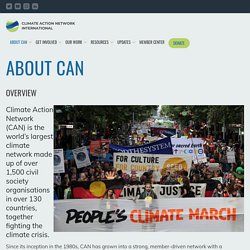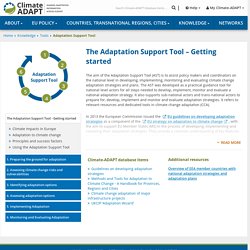

About CAN - CAN. Climate Action Network (CAN) is the world’s largest climate network made up of over 1,500 civil society organisations in over 130 countries, together fighting the climate crisis.

Since its inception in the 1980s, CAN has grown into a strong, member-driven network with a membership spanning all six continents in over 130 countries. With its diversity of membership and long-standing experience in steering the climate movement, CAN continues to seek alignment and build bridges with partners and stakeholders across the climate movement and beyond to pressure governments to take bold and urgent climate action to end the era of fossil fuels and address the needs of the most vulnerable people impacted by the climate crisis. 1988–1994: Founding of CAN and first regional and national networks 1995-2001: The Beginning of COP and Kyoto Protocol In 1995, the first UNFCCC Conference of the Parties (COP) opened in Berlin, by which point CAN membership swelled to nearly 150 groups.
DEEDS Knowledge Base - DEEDS. Achieving net-zero emissions by 2050. Nordic CEOs for a Sustainable Future. Climate Safe Lending Network. Welcome to NOAA Research. Climate Action 100+ World Meteorological Organization. CASCADES. Energy & Climate Intelligence Unit. . – . AST Step 0 — Climate-ADAPT. In 2013 the European Commission issued the EU guidelines on developing adaptation strategies as a component of the EU strategy on adaptation to climate change, with the aim to support EU Member States (MS) in the process of developing, implementing and reviewing their adaptation strategies.

They provide a common understanding of key features relevant to adaptation policy processes, building on the experience available in the EU. The steps and recommendations of the Adaptation Support Tool are aligned with the contents of these guidelines and further improved based on the most recent information and knowledge available, including the experiences of EU Member States with adaptation policy making and insights provided by more recent EU research and innovation projects. The AST is based on the adaptation policy cycle, which is a valuable analytical tool, but in practice, steps may tend to overlap and intermit. Arctic Program > Home. Climate Watch: Data for Climate Action. CCAFS: CGIAR research program on Climate Change, Agriculture and Food Security. Climate Home News. The Fossil Fuel Non-Proliferation Treaty. The Lofoten Declaration: A Global Call for Climate Leadership. Greenhouse Gas Protocol. CLIMATE FOCUS. Klimatanpassningsportalen. Home - Committee on Climate Change.
Home - Berkeley Earth. Open climate science. InsideClimate News: Climate & Energy News, Investigations. Weather and climate change. World Weather Attribution – Exploring the contribution of climate change to extreme weather events.